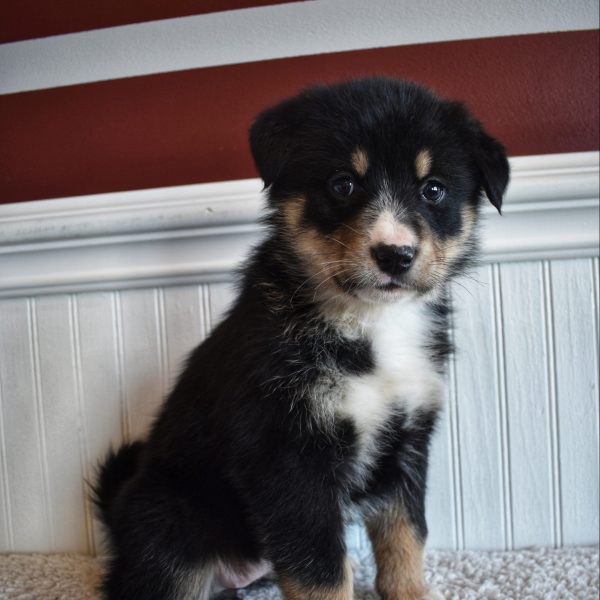
-
Activity Level:
high
-
Shedding Level:
high
-
Grooming Level:
moderate
-
Trainability:
high
-
Good for Novice Owners:
moderate
-
Adaptability:
moderate
-
Kid/Pet Friendly:
often
-
Prey Drive:
high
-
Watchdog:
aware
- Average Size: Large
- Average Lifespan: 8-12 Years
Bernamute Dog Breed Information
Overview
Temperament
Adaptability
Health
Owner Experience
Grooming
Activity Level
Size
Life Span
The Bernamute is a cross between a Bernese Mountain Dog and an Alaskan Malamute. Bernamute puppies grow into large, fluffy dogs that bond closely with their families. They tend to be energetic, playful, and affectionate.
Bernamutes tend to be affectionate and loving dogs that enjoy spending time with their families. As long as they are properly socialized, they tend to be open and friendly. They tend to get along well with children, other dogs, and even strangers once they are introduced.
These dogs can have a high prey drive, which can be an obstacle if there are smaller pets in the household. They are usually good with pets they were raised with and socialized with, but will likely still retain the urge to chase small animals outside the family.
Although they do not tend to bark a lot, Bernamutes are still likely to be vocal dogs like their Alaskan Malamute parents. You can train your dog to stop barking early on to ensure they don’t develop that behavior, but you will likely still have a dog that vocalizes, especially if you encourage them to do it more when they are puppies.
A Bernamute tends to be a moderately adaptable dog. Because Bernamutes grow to be large, energetic dogs, they are better suited to larger homes with fenced yards where they can run. They can adapt to smaller homes as long as they get enough daily exercise and attention, but generally aren’t recommended for small apartments.
Like both are their parents, a Bernamute is a cold-weather breed that prefers the cold, is sensitive to heat, and can overheat easily in warmer temperatures. As one of the dog breeds that love winter, you may have trouble getting them to come back inside when there is snow for them to lie or roll around in.
Because they like being with their favorite humans and bond closely with them, they don’t like spending long periods of time alone. Bernamutes also get bored easily, which can lead to destructive behavior if they do not get enough exercise, attention, or mental stimulation.
Potential health concerns to be aware of in a Bernamute can include elbow dysplasia, hip dysplasia, Von Willebrand’s Disease, blood disorders, progressive retinal atrophy, luxating patella, hypothyroidism, and cataracts. Good breeding practices and the health of the parents make a big difference in the health of puppies.
Reputable breeders will screen their dogs to avoid passing preventable issues to puppies. Make sure you ask about the health and genetic history of both parents. You can also ask about any health tests or clearances that have been done.
As a large dog breed like their parents, Bernamutes are also at risk for bloat. Because bloat in dogs can be dangerous and can quickly become fatal if gastric torsion occurs (i.e. if the stomach flips), it’s important to know how to reduce the risk and identify symptoms so you know when to get help.
Although a Bernese Mountain Dog is one of the best dog breeds for first-time owners, the Alaskan Malamute can be stubborn and strong-willed. A Bernamute tends to be highly trainable in that they are intelligent and pick up things quickly.
Because they could end up being a little bit of a challenge for first-time owners, it’s a good idea to be prepared to enroll in puppy training classes or to work with a dog trainer. This will help keep training consistent and positive, which will help a Bernamute be more eager to please and responsive.
A Bermanute could end up with a Bernese Mountain Dog coat, an Alaskan Malamute coat, or a mix of both. Since both parents are some of the fluffiest dog breeds, you can bet a Bernamute will have a fluffy coat that will shed a bit year-round and heavier as seasons change.
Brushing a few times a week, daily brushing during seasonal shedding, and an occasional bath or visit to the dog groomer as needed will keep a Bernamute coat healthy and looking great. A metal comb, slicker brush, and undercoat rake are a few good types of dog grooming brushes to have available.
In addition to coat care, you will also need to take care of your Bernamute’s nails, ears, and teeth. Nail trims once or twice a month are usually enough to keep nails from growing too long and causing issues. Weekly ear checks with careful cleanings as needed can help prevent ear infections. Daily tooth brushing, along with cleanings at the vet when needed, is an ideal start for good dental care for dogs.
A Bernamute can range from moderate to high energy. Their Berner parent sits in a more moderate range while their Malamute parent is high energy. Daily walks plus some playtime and time to run should be enough for a Bernamute, but they will likely also be up for more activity if you are as long as it’s not too warm outside.
Both of the Bernamute’s parents are considered sturdy dog breeds for outdoor adventures. So, once puppies finish growing and you’re cleared by the vet for higher-impact activities, you can try a lot of things with them. Your Bernamute might enjoy hiking, paddling trips on the water, swimming, playing frisbee or fetch, or even training for dog sports.
A fully-grown Bernamute can stand 23-28 inches tall and weigh 70-115 pounds.
Bernamutes generally live for 8-12 years on average.






